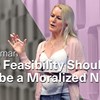need
Does semantic information need to be truthful?
Synthese 196(7): 2885–2906. doi.org/10.1007/s11229-017-1587-5 Abstract The concept of information has well-known difficulties. Among the many issues that have been discussed is the alethic nature of a se
The need for nuance in the null hypothesis significance testing debate
Educational and Psychological Measurement, Vol. 77 (2017), 4, p. 616-630. Abstract Null hypothesis significance testing (NHST) provides an important statistical toolbox, but there are a number of ways i
Eva Erman: Why feasibility need not and should not be a moralized notion
Venue: Institute for Futures Studies, Holländargatan 13 in Stockholm, or online. Research seminar with Eva Erman, Professor of Political Science at Stockholm University. Her research focuses on democrat

Eva Erman: Why Feasibility Need Not and Should Not be a Moralized Notion
Research seminar with Eva Erman, Professor of Political Science at Stockholm University. Her research focuses on democratic theory, specifically on questions of democracy beyond the state, in a global
Simulating the Need for Health- and Elderly Care in Sweden – A Model Description of SESIM-LEV
in: New Pathways in Microsimulation, Eds.: Gijs Dekkers, Marcia Keegan & Cathal O’Donoghue. Pp: 41-60. Ashgate
Do we need dual-process theory to understand implicit bias? A study of the nature of implicit bias against Muslims
in: Poetics AbstractPsychological dual-process theory has become increasingly popular among sociologists. The dual-process framework accounts for two types of thinking; a fast, associative, automatic o
Research seminar Ellen Lust: We Don’t Need No Education: Citizens, States and Development
Ellen Lust, Professor, Department of Political Science, University of Gothenburg. ABSTRACT Conventional wisdom holds that citizens demand high quality service provision across all countries and sectors,

Liberal Nationalism - What is it? Why do we need it? Gustaf Arrhenius and David Miller
Liberalism and nationalism are in many ways contradictory positions. The ideals of open borders, free movement of people, goods and services, cosmopolitanism and internationalism that are associated w

Why we need research on AI impact now. Pontus Strimling (introduction from Gustaf Arrhenius)
Artificial intelligence is already here and is changing society. But social science research on the impact of AI and which choises and ethical considerations societies will face due to developments in

Liberal Nationalism - What is it? Why do we need it? Gustaf Arrhenius and David Miller
Liberalism and nationalism are in many ways contradictory positions. The ideals of open borders, free movement of people, goods and services, cosmopolitanism and internationalism that are associated w








